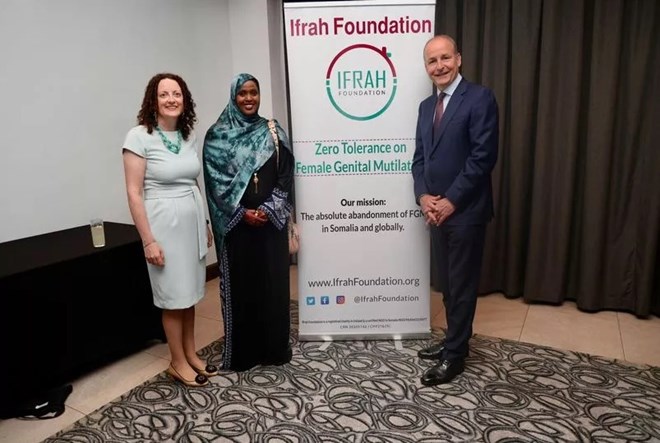
By Louise Burne Political Correspondent
Monday July 22, 2024
Female Genital Mutilation (FGM) survivor and advocate Ifrah Ahmed said she wants her four-and-a-half-year-old daughter Sara to be brought home to Ireland if she is harmed in the course of her advocacy work.

Ifrah Ahmed with Caitríona Ingoldsby, Ambassador of Ireland to Kenya (left) and Tánaiste Micheál Martin. (Image: Phil Behan/DFA)
A Somali woman who sought asylum in Ireland nearly two decades ago has said that less integration and fewer supports for international protection applicants are adding to hostility.
As she acknowledged a shift in attitude towards those seeking asylum in Ireland, Female Genital Mutilation (FGM) survivor and advocate Ifrah Ahmed said she wants her four-and-a-half-year-old daughter Sara to be brought home to Ireland if she is harmed in the course of her advocacy work.
Ms Ahmed came to Ireland as a refugee in 2006 from Somalia and now holds an Irish passport.
Asked by the Irish Mirror in Nairobi, Kenya, if she had noticed a difference in people’s attitudes since, Ms Ahmed says she “doesn’t know what happened”.
“When I come to Ireland, the people were more friendly,” she said.
"I [took a] decision to integrate to the young people. I used to go to schools and I give a speech and I talk about why people emigrate to other countries, including Irish themselves 100 years ago. But I think now, because there is a lesser integration, there is a lot less support for the community within Ireland, that’s what make people to get more angry.
“We used to have a lot of community activities, even the community police, we used to do diversity events. People used to come together and that shows solidarity of the community. Whereas now everybody's going his own way and everybody's moving. Of course, I can understand why people are so angry because of the homelessness in the country makes people angry and upset.
“I think what we need is our government to work together and also make sure that everybody deserves a chance to be given life and opportunities.”
When Ms Ahmed arrived in Ireland in 2006 and underwent a medical check, she realised that being “cut”, or FGM, was not normal practice across the world. It is thought that around 98 per cent of girls aged between zero and 13 in Somalia undergo FGM each year.
Ireland legislated to ban FGM in 2012. After speaking in the European Parliament, Ms Ahmed decided she wanted to return to Somalia to change legislation in her home country. Ifrah said she went back to Somalia in 2014, which she said was a “real danger” due to Al Shabaab. She says that it is still dangerous for her to travel and this is exacerbated by concerns about her young daughter.
Ms Ahmed explained: “Every time I leave, I give [my daughter one] last kiss and I tell her ‘I don't know if I'm going to come back. But inshallah, if God's willing.’ Also I give my will to someone. I say, ‘Please make sure you take her back to Dublin if anything happens’.”
She also expressed concerns about the lack of medical support available to female asylum seekers who have experienced FGM and are moved to direct provision centres outside of Dublin. When this was put to Tánaiste Micheál Martin, he committed to looking into the issue.
He said: “That should not be the case. I will talk to our colleagues in that regard in [the Department of] Health and [the Department of] Children to make sure that access is there. We've many major hospitals outside of Dublin. There is just no excuse for that."